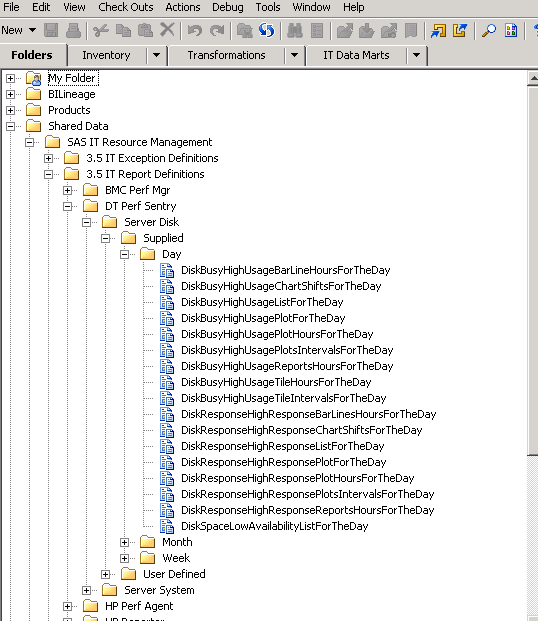How to Modify a Report in a Supplied SAS Enterprise Guide Project
The supplied
SAS Enterprise Guide projects are the source of the reports that the Adapter
Setup wizard creates. Each report in a supplied SAS Enterprise
Guide project corresponds to a report definition that SAS IT Resource
Management provides. After you have run the Adapter Setup wizard
for a given adapter and run the resulting report jobs, you can review
the reports that these jobs create. You can then determine whether
the reports that SAS IT Resource Management provides meet the needs
of your organization.
Note: Your site might not process
data from any of the data sources for which SAS IT Resource Management
provides an adapter. In that case, you can use an alternate data source
to process a sample set of data to run the Adapter Setup wizard
and view the reports that it generates. For example, some data sources
that are commonly available in IT enterprises are these:
Alternatively, you can access samples of reports on
the SAS IT Resource Management website that is located here:
http://support.sas.com/documentation/onlinedoc/itsv/#itrm35.
Scroll down to the section called Samples of Supplied
Reports.
If you want to modify
a supplied report that you view in ITRM Report Center, then you can
use the report properties to identify the supplied project that is
associated with it. You can then copy the corresponding SAS Enterprise
Guide project and modify the copied project as needed. To do so, perform
the following steps:
-
On the workstation where the SAS IT Resource Management client is installed, navigate to
SASITResourceManagementSASEnterpriseGuideComponents\3.5. For example, if you installed SAS IT Resource Management on a 64-bit machine, the projects might be located atC:\Program Files\SASHome\SASITResourceManagementSASEnterpriseGuideComponents\3.5. -
CAUTION:Modify a copy of a supplied SAS Enterprise Guide project only. Do not modify a supplied SAS Enterprise Guide project directly.The supplied SAS Enterprise Guide projects include specifications and IT domain intelligence that SAS IT Resource Management provides for reporting. If you modify supplied projects, be sure to maintain a copy of the original supplied projects. Otherwise, you will lose the specifications and benefits that these projects provide for future reference. For best results, maintain and save the original copies of all supplied projects and report definitions in the
Suppliedfolder and save your modified copies in theUser Definedfolder. For more information, see Managing SAS Enterprise Guide Projects for SAS IT Resource Management. -
If the project includes notes, then review the Project Notes and Process Flow Notes files. You can use the information in these notes files to determine the types of reports that the project creates. These files can also help you understand the general conventions that are used to specify the reports.
-
Modify the reports in the copy of the supplied project. You can use the ProcessFlow and Performance ReportTask properties that you identified previously to locate the specific branch of components in the project that affect the report.For more information, see Working with Supplied SAS Enterprise Guide Projects.
-
For more information, see Working with the ITRM Report Definition Task.
-
Your modifications might include adding a new report definition or changing the name of an existing report definition. In that case, you must use the IT Resource Management client to update the Performance Report transformation in the corresponding report job to add the new report definition or specify the updated report definition with the new name.For more information, see Working with Performance Report Transformations.
-
For more information, see Deploying and Running Report Jobs.
Copyright © SAS Institute Inc. All rights reserved.
